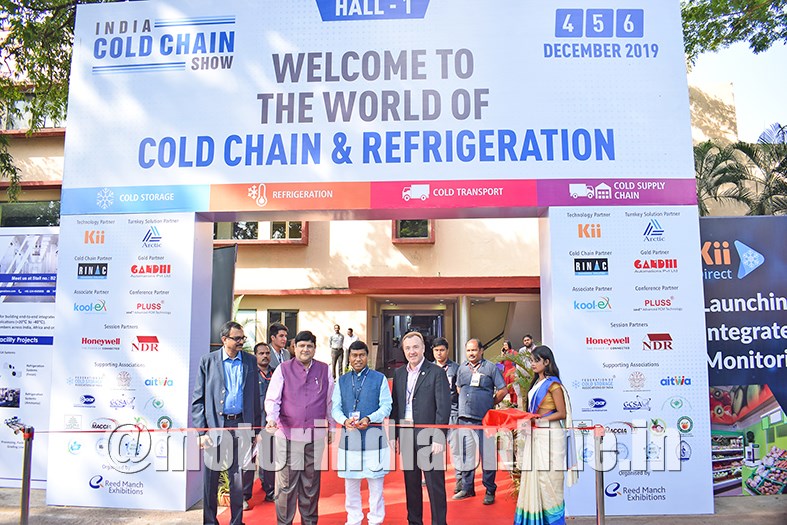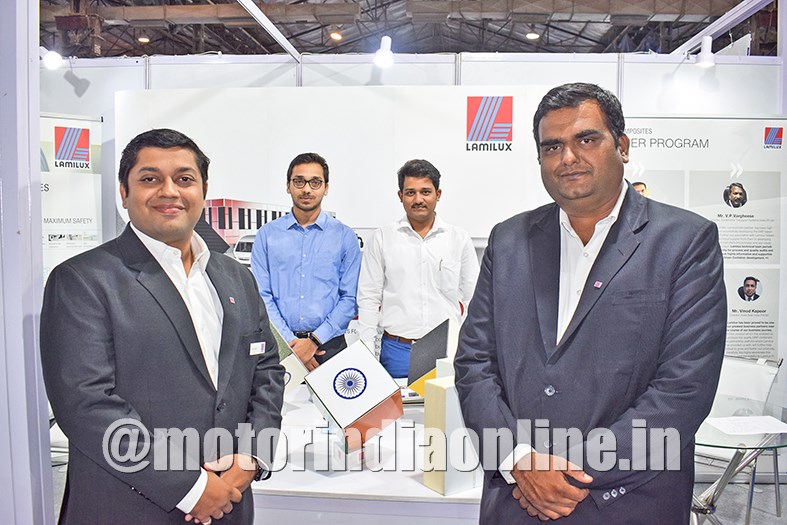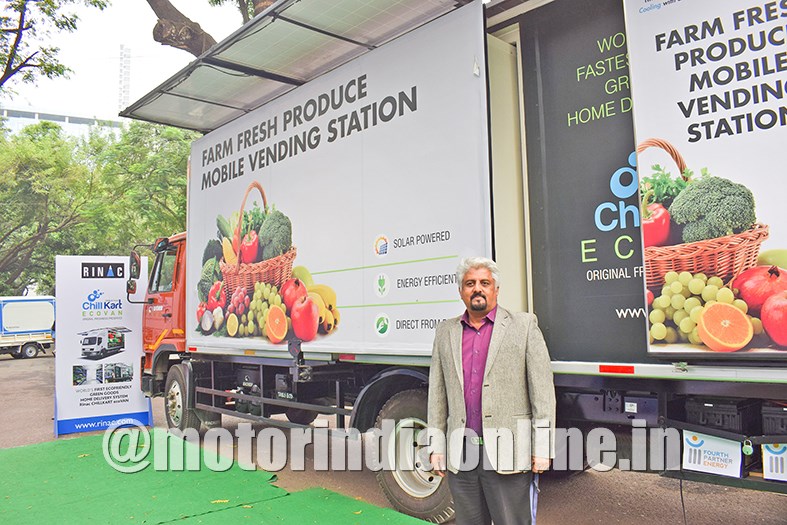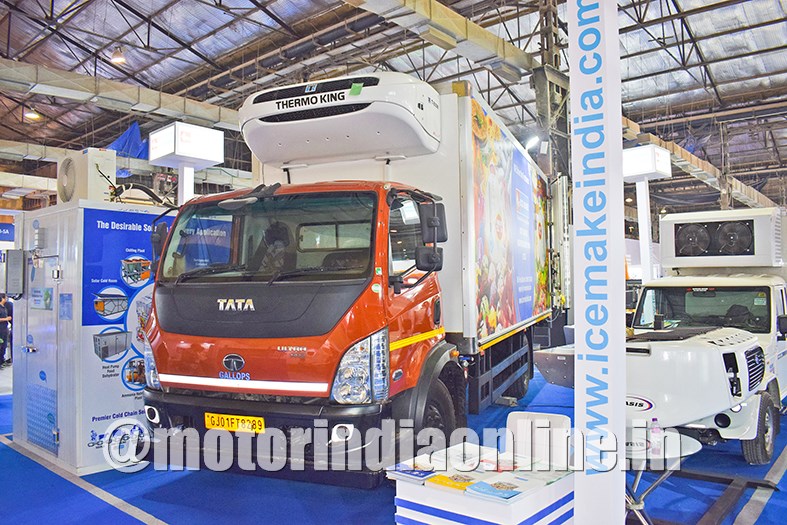India’s biggest event on cold chain and refrigeration explored cost-effective solutions with new and known brands, innovative products and market trends in the cold chain. Rajesh Rajgor reports

With new-to-market technologies focused on cold storage solutions, different refrigeration mechanisms, solutions in reefer transport for supply chain providers, temperature control devices, and composite materials for reefer boxes, India Cold Chain Show (ICCS) 2019 saw participation from leading stakeholders and industry players from across the globe.
According to Gregory Zaraisky, CEO, Reed Exhibitions India, organisers for ICCS, the cold chain industry wholeheartedly welcomed the event, which witnessed a substantial increase in visitor footfall. In a span of three days, key buyers flocked to the Bombay Exhibition Centre in Mumbai to discover cost-effective range of products, solutions and technologies.
These encompassed cold storage, refrigeration, ripening chambers, reefer transport, tracking and Internet of Things (IOT), packaging, cold storage infrastructure, cold logistics, light-weight storage racks, cold chain supply segments, and much more. The trade show brought together exhibitors, influencers and decision-makers to forge connections, conduct business, gain insights, network as well as reconnect. The ‘Cold Chain Summit’ and ‘Pharmaceutical Distribution Conference and Workshop’ successfully created a platform to learn, gain insights, socialise, and find out more about emerging trends in the cold chain in India.

Leading professionals from pharmaceuticals, food processing, retail, meat and seafood, dairy, ice-cream, cold supply chain, and other end-user industry segments attended and discussed practical measures that can be taken to bridge the gap – ranging from storage facilities, last mile delivery, correct material for various temperature requirements, etc. Experts agreed that the industry carries the potential to be the next big wave in India for creating jobs, innovation opportunities, empowering the rural unorganised sector, and most importantly, make India a global brand in exports, vaccines, drugs and food products.
There is a still a huge gap between natural perishable products in India and the available cold chain infrastructure, thereby leading to approximately 40% wastage of the goods produced. This gap actually provides a big opportunity for the warehousing and logistics service provider to improve storage facilities, provide intercity transport and last mile delivery, which many not be the core competencies of a food manufacturer. Making smart technologies and offering them at the right price is the first step to address the challenges of the cold chain industry.

With a large number of cold chain projects, mega food parks, annual grants, subsidies and tax exemption, the Government of India is doing its bit to propel the cold chain industry to a new orbit. It is up to the companies now to analyse the demands of the end consumers and connect farmers to the organised trade to increase the value chain of the cold transportation industry. Meanwhile, the trade show was a window to many of the leading manufacturers to exhibit their latest products. One such was Lamilux that displayed puff-injected panel through colourful cubes.
“We have a tri-colour representation here to prove that one can get GRP in any royal colour and not merely white. These materials provide UV protection and have a gel coat; hence, the colour doesn’t fade. We have also showcased anti-slip material for various kinds of flooring and are also focusing on other applications apart from containers and cold rooms. We are explaining to people that GRP also comes in coils and not just sheets so that now they can easily use it in continuity,” informed Rohan Bellikatti, Regional Technical Sales Manager, South India and Sri Lanka, Lamilux. The company wants to grow step-by-step into different segments after having established themselves in the truck and bus space.
They have also had enquiries from existing cold chain room owners, who face rust in their existing set-up. “It opens up a retro-fitment opportunity for us. While the original core is retained, GRP comes on the top of PPGI. The material remains the same and provides very good insulation life for at least 10 years. Apart from this, the colour doesn’t fade. It has impact resistance and the material is embossed, providing texture and dust-free wall,” informed Bellikatti. Lamilux is also working on opportunities for anti-bacterial flooring material for operation theatres in hospitals.
At the show, stealing the limelight was Rinac India, which is the largest cold chain OEM in India and operates in 18 other countries. As a cold chain partner, it has developed an innovative refrigerated van – Chill Kart – that can help achieve Indian government’s ambition to double farmers’ income.
Elaborating about the product, Soji Abraham, Senior Vice President, Rinac India Ltd., said: “This way we can ensure that farmers get a proper price for their produce and also help the produce from the farm reach directly to the people. Any farmers’ organisation can come together to buy this vehicle and weed out the middlemen. The eco van’s refrigeration runs on solar energy.”
“There are two things that make this product unique. The first is that it does not use conventional fuel for emission so that the cost of transportation comes down from Rs. 4.5 per kilogram to 45 paise per kilogram and secondly, it is a ‘green’ technology product. In a single year one truck saves about 7.4 tons of CO2 emission,” he added. The thermal back-up takes care of the temperature for over 10 hours. “You can also connect the truck to direct power and charge the system,” Abraham said. The van has the capability to carry 2 tons of fruits and vegetables and is claimed to be the world’s first eco-friendly refrigerated green goods van. A demonstration of this van is available on the YouTube channel.
Focusing on ground level needs, cold box manufacturers like Ice Make, Subzero and Path Insulation showcased their expertise in GRP-based refrigerated containers, dry insulated containers, eutectic mobile containers in order to deliver sustainable, safe and high-quality refrigerated transportation.
Sub Zero, a leading manufacturer of reefer trucks manufacturing bodies for 3-wheelers up to 40 feet trailers for all temperature controlled applications, displayed fully-built reefers built on Mahindra Bolero pick up trucks, ideal for last mile deliveries. The display was done in association with Mahindra VAP (Value Added Products) division. According the Sub Zero, the fully-built single invoice process makes it very convenient for customers to purchase these vehicles as a standard product.
Gandhi Automation, India’s foremost entrance automation and loading bay equipment company, showcased retractable dock shelters with PVC front panels. They also had inflatable dock shelters with elastomeric tubes designed to round out gaps with the introduction of a medium – usually air – to form a tight barrier between a mounting and striking surface, which helps in sealing air gaps.
The show, which was inaugurated by Rameshwar Teli, Minister of State, Ministry of Food Processing Industries, also offered many new temperature control devices, heating mechanisms, software and updates to improve temperature as well as temperature monitoring devices. Undoubtedly, ICCS 2019 delivered on its promise and brought forward the best in cooling to the cold chain industry in India from around the world. Some of the other leading exhibitors at the show included Frick India Ltd., Idealin Fogging Systems, Magnus Composites, Pearl Ice, Salco, Super Valves, Tata Pipes, TCI Cold Chain, Nilkamal, Prince Piping Systems, etc.
